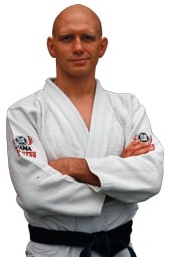
Today I want to share the single best piece of advice I ever got from sport psychology.
Let’s set this up by supposing that you have an ambitious goal, like getting your BJJ brown belt, or winning a medal in a major competition…
To achieve that goal you’ve obviously got to do lots of drilling, sparring, conditioning, etc. All these things get your body into shape and ready for action. But when we’re talking about elite jiu-jitsu then almost everybody is in shape. And most people are fast and strong and have great timing.
What really separates the wheat from the chaff at that high level is the stuff that goes on between the ears. (Yogi Berra said it best: “Half of this game is ninety percent mental.”)
This mental stuff includes intangible attributes like self confidence, bravery, and mental toughness.
And it’s in the mental arena where most people who could have been great fall short.
So what’s the best way to train the mental aspects of the game?
Well, the big insight I got from sports psychology is this: small successes lead to large successes.
And if that’s true, then the key thing to achieve a big, giant goal is that to break it down into a series of small achievable steps.
The steps have got to be small enough so that they don’t take forever. And you’ve got to engineer the challenges so that they’re achievable.
Over time, as you succeed again and again, you develop the ‘habit’ of winning. You come to expect success in the things that you do, and this self confidence will shine through in everything that you set your mind to.
What does this look like in reality?
Let’s say that you want to master a new throw. You want to dial it in so that you can throw almost anybody with it at any time.
If you just rep the technique a few times and then try that throw against the biggest, baddest black belt in the club it’s probably NOT going to work. He’ll know how to counter it.
Your goal was too large, and failure was almost guaranteed. Fail enough times like that and it’ll erode your confidence.
Instead eat the elephant in small bites.
Break the complex task down into small achievable chunks.
When it comes to this throw, your initial goal, your first chunk, might be to get good at obtaining your preferred grip (gripping is absolutely CRITICAL when it comes to throwing) .
No matter what kind of grip your opponent tries to get you want to learn how to counter it and lock onto him with your own grip instead. Then go and practice this first step – getting your grip – in sparring until you have some success with it. Give yourself a big high five every time you get the grip you want, even if they break free a few seconds later.
It’s perfectly OK to get your grip and then not be able to throw your opponent. Throwing your opponent is the big goal, the distant goal. What you’re concentrating on right now is a much smaller piece of the puzzle.
Once you’re comfortable with gripping then move onto the next achievable step.
In the case of learning a throw then the next step might be using your grip to off balance your opponent and make him step a certain way. Pull him this way, pull him that way, and force him to step forward with his right leg.
Wash, rinse, repeat.
Figure out how to make him take that step. Every time you get your grip, off balance your opponent and make him take that step go and give yourself a pat on the back. You’re making progress.
Once you’re doing this consistently it’s time to add another small, incremental, measurable goal.
Maybe now it’s time to start working on the throw itself. Figuring out how to toss someone flat on their back, even when they know what’s coming and what you’re trying to do to them.
After you get good at that you might add a few specific setups and combinations until they start working for you.
Then work on a few followups to the throw..
Before you know it you’ll have a new technique you can rely on to work even against bigger, skilful opponents.
Let’s change gears and say that you want to win a medal in a really big tournament.
How could you break down that ambitious goal into smaller, achievable steps?
Your program should include certain specific goals. The goals will not by my goals – they will vary depending on your starting point, your initial level of training, and the amount of time you have to achieve your goal
Off the top of my head here’s what some concrete, measurable goals might look like:
- Training at least four times this coming week.
- Watching one hour of competition footage per week.
- Being able to spar for 40 minutes, switching to a new, fresh opponent every 5 minutes
- Running 10 km in less than 50 minutes
- Doing 15 strict pull-ups and/or 20 kipping pull-ups
- Doing 100 repetitions of your bread and butter guard pass before you train each day.
- Competing once a month in smaller tournaments for 6 months (super useful for learning to deal with competition nerves btw)
When it comes to developing self confidence the important thing is that you keep on looking for your next small success.
There’s a reason that a journey of a thousand miles begins with a single step: everybody can take a single step. It’s a small, discrete, measurable and achievable goal.
Small successes lead to large successes.
What’s your next small success going to be?


